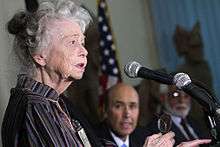Nancy Dupree
| Nancy Dupree | |
|---|---|
 Nancy Hatch Dupree giving a speech during the International Architectural Ideas Competition at the National Museum of Afghanistan in September 2012 in Kabul, Afghanistan | |
| Born |
1927 (age 88–89)[1] Kerala, India |
| Nationality | American and Afghan |
| Occupation | Administrator |
| Title | Director of the Afghanistan Center at Kabul University |
| Successor | Incumbent |
Nancy Hatch Dupree (born 1927)[1] was born in India to American parents and went to Barnard College and Columbia University.[2] She is the director of the Afghanistan Center at Kabul University in Afghanistan and author of five books that she compiled while studying the history of Afghanistan from 1962 until the late 1970s. She first arrived in Afghanistan in 1962 as a diplomat's wife. Several years later, she met Louis Duprée, who was a renowned archaeologist and scholar of Afghan culture and history. The two fell in love and got married after divorcing their former spouses.[3] After the Soviet invasion of Afghanistan in 1979, Nancy was forced to leave the country, while Louis remained. Rather than return to the United States, she moved to a refugee camp in Peshawar, Pakistan.[4] Louis was eventually arrested under suspicion of working for the Central Intelligence Agency (CIA) as a spy. He then joined Nancy in Peshawar. While in the refugee camp, Nancy realized the potential for the loss of unique documents about Afghanistan to be lost or destroyed forever. In order to preserve these works and to teach them to a new generation, she and Louis formed the Agency Coordinating Body for Aghan Relief (ACBAR). They began to collect both government and non-government documents that related to the country's history, culture, the Soviet Invasion, the Mujahedeen, and the Taliban.[4] Nancy said that in the looting that began after the Soviet invasion, many priceless books were sold to be used for fuel. A large number of books were also sold by weight to be used to wrap food. After the Coalition forces moved into Afghanistan in 2001, Nancy and Louis did not immediately move back. They were concerned for their own safety and that of ACBAR's collection, which by 1999 consisted of 7,739 titles written in Pashto, Dari, French, German, Norwegian, and Swedish.[4] In 2005, Nancy moved back to Kabul and worked with the Afghan government to find a place to house ACBAR's collection. The collection was moved to Kabul University and the name was changed to the Afghan Collection at Kabul University. A $2 million building was completed to house the collection in 2012.
Louis and Nancy Hatch Dupree Foundation
In 2007, Nancy Hatch Dupree established the Louis and Nancy Hatch Dupree Foundation. It is a charitable organization that promotes scientific studies and raises awareness of the history and culture of Afghanistan. In addition this organization also preserves Afghani cultural heritage. The organization's primary goal is to ensure the sustainability of the Afghanistan Center at Kabul University (ACKU). Programs offer Afghans from all walks of life, especially the youth, incentives to acquire and employ information that will help them address the challenges of rebuilding their nation.
The organization has been able to achieve its overall goal by purchasing books and providing them to the schools in some part of Afghanistan that has never had any library. Due to the instability the organization have not been able to achieve all of its goals as an active NGO.
Personal
Dupree was born in 1927 to American parents in Kerala (then Travancore) in India, on the Arabian Sea coast. Her parents were working in Kerala on rural development programs, and also were involved in village community drama. Dupree spent most of her childhood in Kerala. She subsequently also lived with her parents in Latin America.
Dupree divides her time between Afghanistan and her other home in North Carolina.[5]
Works
- A Historical Guide to Afghanistan (1972)
- An Historical Guide to Kabul
- A Guide to the National Museum
References
- 1 2 Dalrymple, William (5 April 2013). "I Think I'll Just Finish My Chips". Newsweek Pakistan (AG Publications (Private) Limited). Archived from the original on 12 January 2015. Retrieved 12 January 2015.
- ↑ http://www.nytimes.com/2002/07/09/theater/love-affair-with-afghanistan-continues-74-her-guidebook-inspired-play-she-fights.html
- ↑ Graham-Harrison, Emma (26 March 2013). "From Kabul love affair to Afghanistan's first centre for study of its history". The Guardian. Retrieved 2015-01-12.
- 1 2 3 Moustafa, 2016
- ↑ http://www.dailymail.co.uk/news/article-2874148/American-woman-87-called-grandmother-Afghanistan-seeks-preserve-country-s-storied-past-research-center.html
External links
- The Louis and Nancy Hatch Dupree Foundation
- Museum Under Siege: Full Text by Nancy Hatch Dupree
- ABLE in Afghanistan
- A Chronicler of Afghan Culture, Now Its Loyal Guard
- Preserving Afghanistan's Cultural Heritage: An Interview with Nancy Hatch Dupree
- Nancy Dupree's love affair with Kabul at the Wayback Machine (archived March 6, 2012)
- Groundbreaking ceremony for new library at Kabul University: 25 July 2009
- "Who is the Historian? A portrait of Nancy Dupree by www.kabulatworkatwork.tv on YouTube
- Interviews with an Afghan Legend Part I: ACKU Founder Nancy Hatch Dupree on Documenting and Digitizing Afghanistan's Cultural Heritage (an Edward Zellem interview series)
- Interviews with an Afghan Legend Part II: Nancy Hatch Dupree on ABLE, Afghan Education, and Self-Sufficiency
- Afghan Legend Nancy Dupree Part III: New ACKU Building Combines Traditional Afghan Architecture and 21st Century Education
- Afghanistan Center at Kabul University
- Moustafa, Laila Hussein. "From Peshawar to Kabul: Preserving Afghanistan’s Cultural Heritage during Wartime" RBM: A Journal of Rare Books, Manuscripts, and Cultural Heritage, 17(2), 134-147.